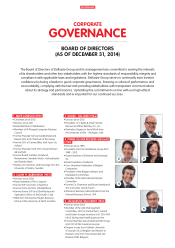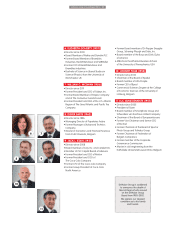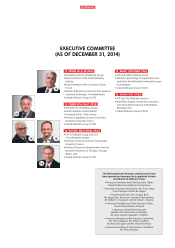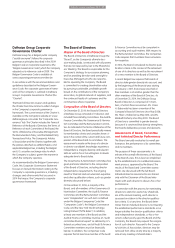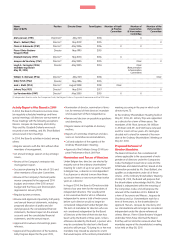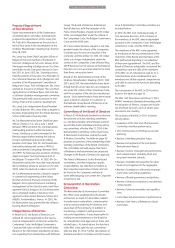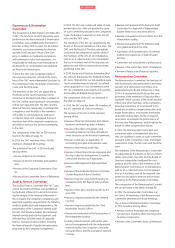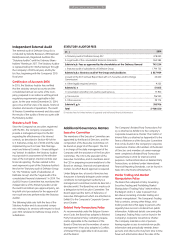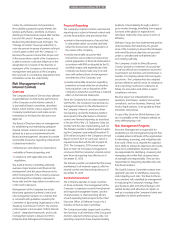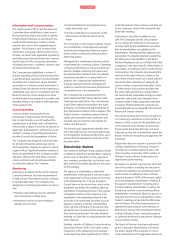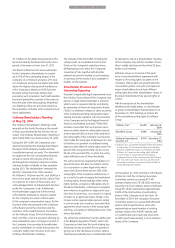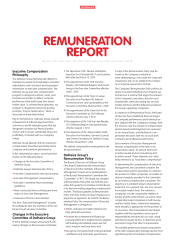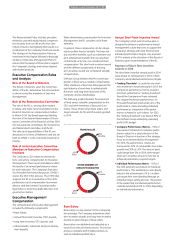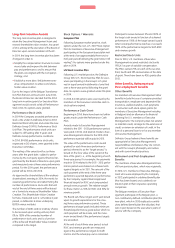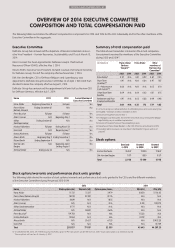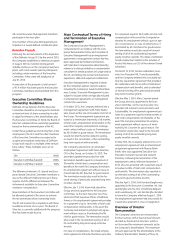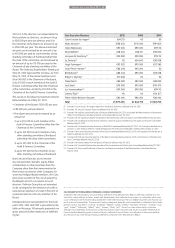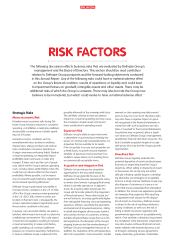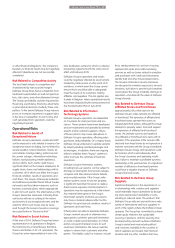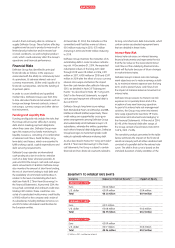Food Lion 2014 Annual Report Download - page 58
Download and view the complete annual report
Please find page 58 of the 2014 Food Lion annual report below. You can navigate through the pages in the report by either clicking on the pages listed below, or by using the keyword search tool below to find specific information within the annual report.
Information and Communication
The Chief Executive Officer and the Executive
Committee have established a clear tone at
the top that they expect associates to adhere
to high ethical standards as described in the
Guide for Ethical Business Conduct, and to
exercise due care in their assigned respon-
sibilities. This includes a duty to ensure that
information is properly collected and commu-
nicated, consistent with applicable regulations
and data privacy laws and directives, concern-
ing all aspects of the Company’s operations,
including associates, customers, vendors, and
all related financial reports.
The Company has established a system of
uniform reporting of financial information that
is performed both upstream and downstream
and allows the Company to detect potential
anomalies in its internal control framework. A
detailed financial calendar for this reporting is
established every year in consultation with the
Board of Directors and is designed to allow
for information to be prepared accurately, and
reported timely, in accordance with legal and
other requirements.
Control Activities
Control activities include policies and
procedures to help monitor and manage
risk. Control activities occur throughout the
organization, at all levels and in all functions.
They include a range of activities as diverse as
approvals, authorizations, verifications, recon-
ciliations, reviews of operating performance,
security of assets and segregation of duties.
The Company has designed control activities
for all relevant business processes across
each operating company as well as its group
support offices. Significant policies and proce-
dures are published on the Company’s public
websites, intranet sites and other communi-
cation portals as well as being periodically
circulated throughout the Company.
Monitoring
Monitoring, as defined in the COSO’s Internal
Control Framework, has been implemented
to help ensure “that internal control continues
to operate effectively.” The Company had
designed its monitoring procedures to ensure
that:
• Internal control deficiencies are identified
and corrected on a timely basis;
• Information used in decision-making is
reliable and accurate;
• Financial statements are prepared accu-
rately and timely; and
• Periodic certifications or assertions on the
effectiveness of internal control can be
made.
The Company’s monitoring procedures consist
of a combination of management oversight
activities and independent objective assess-
ments of those activities by internal audit or
other third parties.
Management’s monitoring of internal control
is performed on a continuous basis. Operating
company performance is measured and com-
pared to budgets and long-term plans and
key performance indicators that may identify
anomalies indicative of a control failure. In
addition, the Company has implemented
a group-wide performance management
system to monitor and measure performance
consistently across the organization.
The Company has a professional internal
audit department that reports directly to the
Chief Internal Audit Officer. The Chief Internal
Audit Officer reports functionally to the Audit
& Finance Committee and administratively to
the Chief Financial Officer of the Company. The
Audit & Finance Committee reviews Internal
Audit’s risk assessment and audit plan, and
regularly receives internal audit reports for
review and discussion.
The internal audit department identifies inter-
nal control deficiencies, communicates timely
to management and periodically follows up to
ensure that the appropriate corrective action
has been taken.
Shareholder Matters
Each holder of Delhaize Group ordinary shares
is entitled to attend any shareholders’ meeting
and to vote on all matters on the agenda of
such meeting, provided that such holder com-
plies with the formalities specified in the notice
for the meeting.
The rights of a shareholder to attend the
shareholders’ meeting and to vote are subject
to the registration of these shares in the name
of this shareholder by 11:59 pm (European
Central Time) on the record date, which is the
fourteenth day before the meeting, either by
registration of registered shares in the register
of registered shares of the Company, or by
registration of dematerialized shares in the
accounts of an authorized securities account
keeper or clearing institution. Shareholders
must notify the Company (or the person des-
ignated by the Company for this purpose) of
their intent to participate in the shareholders’
meeting, no later than six days before the date
of the meeting.
Similarly, a holder of Delhaize Group American
Depositary Shares (“ADSs”) who gives voting
instructions to the depositary must arrange
for having those ADSs registered by 11:59 pm
(Central European Time) on the record date set
by the Company, which is the fourteenth day
before the meeting.
Each share or four ADSs is entitled to one
vote. The Company’s Articles of Association
do not contain any restriction on the exercise
of voting rights by the shareholders, provided
that the shareholders are admitted to the
Shareholders’ Meeting and their rights are not
suspended. The relevant provisions governing
the admission of shareholders to the Share-
holders’ Meeting are set out in Article 545 of the
Companies Code and Article 31 of the Articles of
Association. According to Article 6 of the Articles
of Association, the Company may suspend the
exercise of the rights vested in a share in the
event there are joint owners of a share until one
person has been appointed in writing by all
such co-owners to exercise those rights. Article
10 of the Articles of Association provides that
the voting rights pertaining to unpaid shares
are automatically suspended as long as called
payments, duly made and claimable, have
not been made. Finally, voting rights attached
to treasury shares held by the Company are
suspended (please see page 88 of this Annual
Report as to treasury shares).
The Articles of Association of the Company do
not contain any restrictions on the transfer of
shares or ADSs, except for the prohibition set
out in Article 10 of the Articles of Association
that provides the shares that have not been
fully paid up may not be transferred unless the
Board of Directors has previously approved the
transferee.
Belgian law does not require a quorum for the
ordinary shareholders’ meetings. Decisions
are taken by a simple majority of votes cast
at the meeting, irrespective of the number of
Delhaize Group ordinary shares present or
represented at the meeting.
Resolutions to amend any provision of the Arti-
cles of Association, including any decision to
increase the capital or an amendment which
would create an additional class of shares,
require a quorum of 50% of the issued capital
at an extraordinary shareholders’ meeting. If
this quorum requirement is not achieved at
the extraordinary shareholders’ meeting, the
Board may convene a second extraordinary
shareholders’ meeting for which no quorum is
required. Decisions at an extraordinary share-
holders’ meeting are taken by the affirmative
vote of at least 75% of the shares present or
represented and voting at such meeting, or
80% of such shares if the amendment would
change Delhaize Group’s corporate purpose
or authorize the Board to repurchase Delhaize
Group ordinary shares.
The Board of Directors has been authorized
by the Company’s shareholders to increase
the share capital of the Company in one or
more transactions in the aggregate amount of
GOVERNANCE


